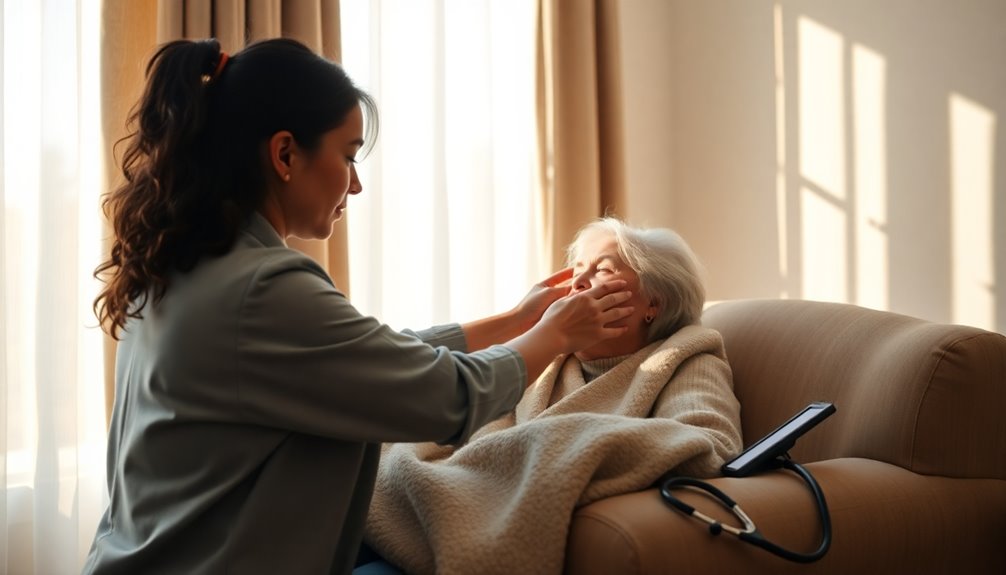Yes, caregivers are considered healthcare workers. They play an essential role in supporting patients with daily living activities, which greatly boosts health and well-being. While caregivers focus on personal care and companionship, they also monitor health changes and assist with medical appointments. This collaborative effort with nurses guarantees thorough patient care. If you're curious about how caregivers and nurses differ in their roles or want to explore more about their impact, there's plenty more to discover.
Key Takeaways
- Caregivers provide essential support for daily living activities, which is a critical aspect of healthcare.
- They enhance patient well-being by assisting with personal care and monitoring health status.
- Although caregivers lack formal medical training, they play a vital role in the healthcare system.
- Caregiving is recognized as a vital component of healthcare, enhancing quality of life for patients.
- Effective collaboration between caregivers and healthcare professionals improves overall patient care and health outcomes.
Understanding the Role of Caregivers in Healthcare

Understanding the role of caregivers in healthcare is essential, especially since they play a significant part in supporting patients' daily living activities.
Caregivers are often considered healthcare workers, as they provide important assistance that contributes to patients' overall health and well-being. Licensed caregivers, like Certified Nursing Assistants (CNAs) and Home Health Aides (HHAs), have formal training that allows them to perform specific medical tasks, ensuring patients receive proper care.
Even unlicensed caregivers play a significant role, helping individuals with their daily needs, which is important for maintaining health and quality of life. Additionally, caregivers often facilitate open communication about feelings, which can greatly enhance the emotional well-being of those they support.
Distinctions Between Caregivers and Nurses

When you consider the roles of caregivers and nurses, it's clear they serve different purposes in healthcare.
Caregivers focus on daily living activities, while nurses handle medical tasks that require extensive training and certifications.
Understanding these distinctions can help clarify their unique contributions to patient care.
Roles and Responsibilities Comparison
While both caregivers and nurses play essential roles in the healthcare system, their responsibilities and scopes of practice differ markedly.
Caregivers focus on providing personal care services, assisting with daily tasks like bathing, grooming, and meal preparation. In contrast, nurses are trained healthcare professionals who perform medical duties, such as administering medications and monitoring patients' health.
Nurses require formal education and certification, while caregivers typically need around 45 hours of training. Additionally, nurses can undertake advanced medical tasks, including wound care and crucial sign monitoring.
While caregivers primarily support clients in their homes, nurses work in clinical settings like hospitals.
Collaboration between nurses and caregivers is crucial, as nurses can perform some caregiver duties, but caregivers can't administer medical treatments. This partnership is especially important for understanding child custody and support in situations where caregivers assist families with children who have special needs.
Education and Training Requirements
Education and training requirements for caregivers and nurses highlight the significant differences in their roles within the healthcare system.
- Caregivers typically need around 45 hours of training.
- Nurses usually complete a Bachelor's or Master's degree.
- Certification is essential for nurses, while caregivers often lack formal certification.
- Certified Nursing Assistants (CNAs) and Home Health Aides (HHAs) undergo specific training.
- Continuous education is required for nurses but not for unlicensed caregivers.
These distinctions underscore how caregivers, while valuable, primarily focus on personal care and companionship.
In contrast, nurses are trained healthcare workers equipped to perform medical duties and manage patient care effectively.
Understanding these education and training requirements clarifies the different roles within the healthcare framework.
Scope of Practice Differences
Understanding the roles of caregivers and nurses reveals significant differences in their scope of practice. Caregivers focus primarily on personal care, assisting with daily activities like bathing, grooming, and meal preparation. Their training typically requires around 45 hours, equipping them to provide companionship and help with daily living tasks.
In contrast, nurses undergo extensive education, often earning a Bachelor of Science in Nursing (BSN) or higher. This training enables them to administer medications, perform medical treatments, and monitor patients' health.
While both roles are essential for patient care, caregivers don't perform medical duties, clearly distinguishing their responsibilities from those of healthcare professionals like nurses. Understanding these distinctions helps clarify the unique value each role brings to patient support.
Key Responsibilities of Caregivers

Caregivers play an essential role in enhancing the daily lives of their clients, as they assist with important activities like bathing, grooming, and feeding.
Their responsibilities extend beyond personal care to include:
- Supporting physical mobility and daily tasks
- Monitoring health status and reporting changes to healthcare professionals
- Providing companionship to boost emotional well-being
- Scheduling and accompanying care recipients to medical appointments
- Performing household chores like meal preparation and cleaning
Essential Skills Required for Caregivers

As a caregiver, you need to connect with your clients through empathy and understanding their unique needs. Patience plays an essential role, especially in handling challenging behaviors that may arise. Additionally, having basic medical knowledge guarantees you can provide safe and effective care while managing their health. Understanding the role of pet therapy can also enhance emotional well-being for clients with conditions such as dementia and Parkinson's.
Empathy and Understanding Clients
- Listen actively to clients' concerns.
- Observe their emotional and physical needs.
- Communicate openly for better connection.
- Respond promptly to changes in behavior.
- Create a safe space for sharing feelings.
Empathy allows you to connect with clients on a personal level, ensuring that you address their needs effectively. Additionally, understanding the impact of nutrition on brain development can guide caregivers in promoting clients' overall well-being.
Patience and Behavior Management
Managing challenging behaviors requires patience, especially when clients face conditions like dementia or cognitive decline.
In patient care, understanding the root of these behaviors—whether pain or frustration—is essential for effective behavior management. By actively listening and validating your clients' feelings, you foster a trusting relationship that encourages cooperation.
Regular training in empathy and conflict resolution enhances your ability to handle difficult situations, reducing stress for both you and your clients.
Remember, showing patience not only helps in managing behaviors but also supports your clients' emotional well-being. Additionally, incorporating mindfulness practices can further enhance your ability to respond calmly and effectively in stressful situations.
Equip yourself with these essential skills, and you'll create a positive, supportive environment that benefits everyone involved in the caregiving process.
Basic Medical Knowledge
Understanding basic medical knowledge is essential for caregivers, as it directly impacts client safety and well-being.
You need to be aware of key health concepts to effectively provide personal care and support. Here are some crucial areas to focus on:
- Recognizing critical signs and their significance
- Identifying symptoms that require medical attention
- Infection control protocols
- Medication management techniques
- Emergency response procedures
Education and Training for Nursing Professionals

Education and training for nursing professionals are essential for delivering high-quality patient care. To start your journey, you'll typically need Certified Nursing Assistant (CNA) training for basic patient care.
As you progress, obtaining a Licensed Practical Nurse (LPN) certification allows you to take on more complex roles. A Bachelor of Science in Nursing (BSN) provides you with in-depth theoretical knowledge, while a Master of Science in Nursing (MSN) is critical for advanced specialization.
Hands-on clinical training helps you gain practical experience in real healthcare settings. Additionally, passing a national licensing examination like the NCLEX-RN is necessary to practice professionally.
Continuous education guarantees you stay updated with the latest medical practices, solidifying your role as an essential health worker in nursing care.
Scope of Practice for Caregivers vs. Nurses

While both caregivers and nurses play essential roles in the healthcare system, their scopes of practice differ markedly.
- Caregivers assist with daily living activities, like bathing and meal prep.
- Nurses perform advanced medical duties, including administering medications.
- Caregivers require about 45 hours of training, while nurses undergo extensive education.
- Caregivers can monitor health statuses but can't perform medical treatments.
- Nurses maintain medical records and monitor critical signs.
Understanding the scope of practice for caregivers versus nurses is significant.
Caregivers provide invaluable support but are limited to non-medical tasks.
In contrast, nurses are trained healthcare professionals equipped to handle complex medical responsibilities, ensuring patient safety and care within the healthcare landscape.
The Impact of Caregiving on Patient Health Outcomes

Caregiving greatly influences patient health outcomes, as the support caregivers provide can enhance overall well-being and quality of life.
By assisting with daily activities, caregivers help patients maintain independence and improve their mental health, leading to lower levels of depression and anxiety. Research indicates that effective caregiving reduces hospital readmission rates by offering ongoing support and monitoring at home.
Additionally, caregivers play an essential role in managing medication adherence, ensuring patients take their medications as prescribed, which directly impacts their health outcomes.
Collaborative care models that involve both caregivers and healthcare professionals enhance communication, resulting in improved patient satisfaction and overall health outcomes.
Fundamentally, caregivers are critical to achieving better health for their loved ones. Moreover, financial independence gained through effective caregiving can significantly contribute to a caregiver's well-being, allowing them to provide better support to those in need.
Addressing Challenges Faced by Caregivers and Nurses

Although caregiving can be rewarding, it often comes with considerable challenges for both caregivers and nurses. Here are some common issues you might face:
- Burnout and stress from demanding responsibilities
- Language and cultural barriers affecting communication
- Insufficient resources that compromise care quality
- Managing challenging behaviors of clients
- Lack of teamwork leading to inefficiencies
Addressing these challenges is vital for your well-being and the health condition of those you care for.
Prioritizing self-care and seeking mental health support can alleviate burnout. Training in cultural sensitivity and behavior management can enhance your skills.
Additionally, advocating for better resources and fostering collaboration with nurses can greatly improve the quality of care you provide.
Frequently Asked Questions
Is a Caregiver Considered a Healthcare Worker?
When you think about caregivers, it's crucial to recognize the tasks they perform.
If you're administering medications or checking critical signs, you might be classified as a healthcare worker, especially if you're certified.
However, if you're providing companionship and non-medical support, you may not fit that classification.
The distinction often hinges on your training and the specific tasks you handle, impacting how society views your role in the healthcare landscape.
Is Caregiving Part of Healthcare?
You might wonder if caregiving is part of healthcare. It definitely plays an important role in the overall health system.
Caregivers provide essential support that can influence health outcomes, even if they don't perform medical tasks. By assisting with daily activities and offering emotional support, you help individuals maintain their well-being.
What Category Does a Caregiver Fall Under?
Did you know that nearly 40 million Americans provide unpaid care to adults?
When considering what category a caregiver falls under, it often depends on their training and the tasks they perform. Licensed caregivers, like CNAs and HHAs, are typically classified as healthcare workers, while unlicensed caregivers, focusing on daily living assistance, mightn't be.
Ultimately, your role and responsibilities determine your classification within the broader healthcare framework.
What Is a Caregiver Classified As?
A caregiver's classification often depends on their training and responsibilities.
If you're a licensed caregiver, like a Certified Nursing Assistant (CNA) or Home Health Aide (HHA), you're typically recognized as a healthcare worker due to your formal training and health-related tasks.
However, if you're unlicensed and provide essential support without medical duties, you mightn't be classified as a healthcare professional.
Understanding this distinction is fundamental for legal and employment reasons.
Conclusion
To sum up, caregivers are indeed crucial threads in the intricate tapestry of healthcare. While their roles differ from nurses, both contribute markedly to patient well-being. Understanding these distinctions helps clarify their unique contributions and challenges. As the healthcare landscape evolves, recognizing caregivers as essential allies can enhance collaboration and improve outcomes. Just as a symphony requires each instrument to harmonize, effective healthcare relies on the collaboration of caregivers and healthcare professionals working together.









